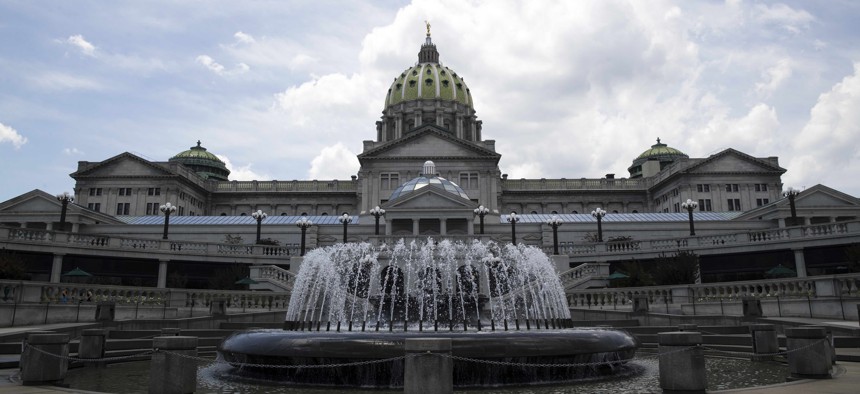Pennsylvania Law Will Automatically Seal Some Criminal Records

Shown is the Pennsylvania Capitol building in Harrisburg, Pa., Monday, July 10, 2017. AP Photo/Matt Rourke

Connecting state and local government leaders
Gov. Tom Wolf signed the "clean slate" legislation on Thursday. Other states are eying similar bills.
Pennsylvania will begin automatically sealing criminal justice records in the state for some misdemeanors and arrests under legislation Gov. Tom Wolf signed into law in Harrisburg on Thursday.
The “clean slate” bill will automatically seal records for low-level misdemeanors that resulted in a less than two year prison sentence, if the person who committed the offense has avoided trouble with the law for 10 years. It contains similar provisions for sealing records related to charges that did not lead to convictions.
Wolf and others say that lingering records for relatively minor, nonviolent offenses can haunt people for years, creating roadblocks for them as they seek jobs, higher education and housing.
“This is time that we do this,” Wolf said during a conference call with reporters on Thursday.
“We’ve over-criminalized our system,” he added.
The Pennsylvania law does not cover felonies, or more serious crimes, such as those involving firearms, sexual assault, or kidnapping. People who have at any time been convicted of a felony would not be eligible to have their records automatically sealed.
Under the law, the Administrative Office of Pennsylvania Courts and the state police have two years from today to identify and process records that are initially eligible to be sealed automatically.
But beginning in 180 days, people meeting comparable criteria for the automatic record sealing program will be able to petition in court to have records shielded from public view, and shared only with law enforcement authorities and some other government agencies.
Wolf is a Democrat and both houses of the Pennsylvania General Assembly have Republican majorities. But the bill cleared both chambers easily, with lawmakers voting for it unanimously in the Senate and only two lawmakers voting against it in the House.
The governor said that the legislation fits well with a broader framework for criminal justice reform that he has been pursuing. “This was an area of easy agreement,” he added.
The Democratic-leaning Center for American Progress, one of the groups backing the Pennsylvania law, characterized it as first-of-its-kind. It also has the endorsement of FreedomWorks, a conservative and libertarian group that advocates for small government.
“We’re confident Clean Slate is going to serve as a model for all of those focused on criminal justice reform,” said Jason Pye, vice president for legislative affairs at FreedomWorks.
National Football League players for the Philadelphia Eagles are among the others who pushed for the legislation.
Wolf said he is aware of other states, including Michigan, Colorado, and South Carolina, that are looking at similar bills.
U.S. Rep. Lisa Blunt Rochester, a first-term Democrat from Delaware, said she is working on a federal version of the legislation.
“We don’t want it to just be one state, we want this to be national,” she said.
The bill that the congresswoman is working on is still in draft form. Blunt Rochester said she hopes to have text for the bill completed by the end of the next month. She said that she’s already spoken with Republicans who are interested in the legislation.
Pye said FreedomWorks plans on being actively involved in pushing for the congressional bill.
A Pennsylvania House memo describing the state’s clean slate legislation says nearly three million residents there, or about 37 percent of the state’s working age adults, are estimated to have criminal records. Many of the records are for minor offenses, the memo adds, or for arrests that did not end in convictions.
Wolf cited figures indicating that the number of employers, landlords and colleges using background checks for applicants has been on the rise. “It’s one strike, and you’re out,” he said. “Even a minor criminal record can be a life sentence to poverty.”
Bill Lucia is a Senior Reporter for Government Executive's Route Fifty and is based in Washington, D.C.

NEXT STORY: Commercial Spaceports Still Waiting for Liftoff





